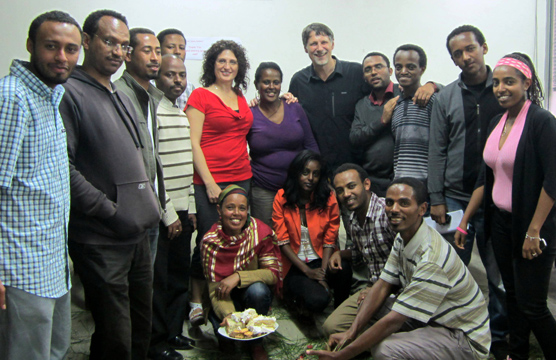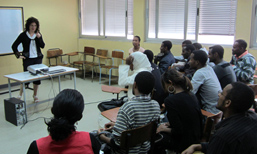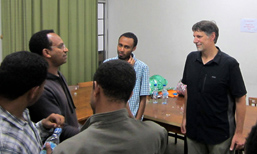Faculty Help Build Program, Relationship With Addis Ababa Institute of Technology in Ethiopia

 Enlarge
Enlarge
During a trip to Africa in 2009, Profs. Todd Austin and Valeria Bertacco visited Addis Ababa Institute of Technology (then known as Addis Ababa University) in Ethiopia to give a talk about Michigan Engineering. On that trip, not only did they find Biruk Mammo, who is now working in Prof. Bertacco’s lab as a doctoral student and was recently awarded a Rackham International Student Fellowship, but they discovered great enthusiasm amongst a number of students for electrical engineering and computer science.
But Austin and Bertacco noticed that AAIT’s program in ECE was severely lacking in resources. “Their classrooms were mostly blackboard and book-based and the computer labs were overcrowded,” Bertacco said.

 Enlarge
Enlarge
The professors set out to change that. They reached out to industry and even into their own pockets to set up a lab that opened in the summer of 2011. Semiconductor firm Xilinx donated field-programmable gate array boards, which are reconfigurable integrated circuits used in digital design classes. NVIDIA donated Compute Unified Device Architecture (CUDA) boards for parallel programming courses and research. Intel provided some computers and the two professors purchased additional computers to establish a modern 25-machine computer lab where undergraduates can work on computer engineering projects.

 Enlarge
Enlarge
This year, Austin and Bertacco spent sabbaticals at AAIT, continuing their work on establishing collaborations with the institution. In March, they shipped another 10 computers for use in labs, and from March through July they lectured and taught courses for masters level students. Austin created and taught a course on computer security, and Bertacco created and taught a course on fault-tolerant computing. The two also started a reading group for masters students and lecturers, and gave talks on topics such as how to do research and how to prepare for the GRE and apply to graduate school.
On July 25, the computers that they had shipped from Ann Arbor in March arrived. “One of the things that we learned,” said Austin, “was just how different the culture is in Ethiopia. Many things move more slowly here, and patience and a long view are required.”

 MENU
MENU 
